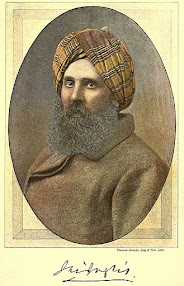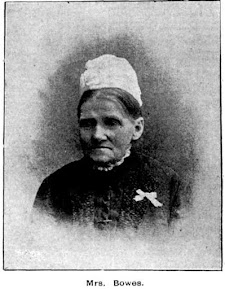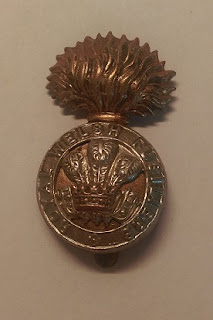Time for a cuppa!
In winter there is nothing more warming than a hot cuppa but in summer there is nothing more refreshing - well that's what my mother always used to say...
So, with a cuppa next to me I am composing this week's blog in honour of -
JAMES INGLIS
James was born in 1845 in Forfarshire, Scotland, the son of the Reverend Robert Inglis and his wife Helen. After his education in Edinburgh, he visited New Zealand in 1864 to join the gold rush. 1866 saw him heading to India where his brother Alexander was a Calcutta tea merchant. He settled there as an indigo planter; indigo being a natural source for blue dye. James indulged in tiger hunts and other activities that would be considered distasteful nowadays and wrote many sporting verses about his adventures under the banner of "Maori".
James Inglis in Indian garb - Wikipedia
Suffering from rheumatism he set sail in 1877 for Australia to forge business opportunities between both countries. His health improved, he edited the Newcastle Morning Herald for a time and became Secretary of the Australasian Accident Assurance Association. In 1879 he married Mary Nichol.
When the Garden Palace Exhibition in Sydney opened in 1879 Calcutta tea merchants were keen to be represented. They formed an association with Indian tea planters and appointed James to represent their interests at the Exhibition. In 1883 he formed a partnership with William Pitt Brown, and they traded as Inglis, Brown & Company with offices in Sydney. In 1884 Inglis had bought "Craigo" in Strathfield where he showed that Indian crops and rare plants could be grown with success. The product "Billy Tea" was created in 1886. The partnership was dissolved in 1887 and James Inglis & Co. was formed.
Garden Palace Sydney - Dictionary of Sydney
By 1893 James Inglish & Co. was selling over 272,000kg of tea per year under their trademark "Billy Tea", and over 500,000kg of packaged teas. The company is credited with founding the packet tea trade in Australia. In 1899 James Inglis & Co. became a limited liability company and on the 25th of March 1901 moved to larger premises. The company also had a printing plant, allowing retailers to order their business name printed on packets of tea to personalise their products. Soon after James Inglis & Co. Ltd became Inglis Limited.
Billy Tea is named after the billy tins used in the outback to make tea. The billy was filled with hot water, tea and eucalyptus leaves and swung around several times to infuse the water. The eucalyptus leaves gave the tea is fresh unique flavour.
To advertise its tea, the company used an image of a swagman boiling his billy. James purchased the rights to the song "Waltzing Matilda". Some of the original words of "Banjo" Paterson were changed for an arrangement of the song which was published in 1905 and the earliest known printed version of the song. Marie Cowan, the wife of the Billy Tea's manager, was credited on the cover as having arranged the music.
Inglis, with an eye for an advertising opportunity, included a free copy of the newly arranged sheet music of "Waltzing Matilda" with every packet of tea sold.
Billy Tea advertisement - National Library
Besides running a successful tea company, Inglis represented the New England area of NSW in the Legislative Assembly from 1885-1894 and in 1886 was the vice-president of the Freetrade Association. Despite hopes of become the first minister of agriculture under the Henry Parkes government, he accepted the Ministry of Public Instruction controlling reformatories, industrial schools and training vessels in 1887.
James was a very busy man and served on many various organisations such as the Savings Bank of NSW, Royal Prince Alfred Hospital, several mining companies, the Zoological Society of NSW as well as being a member of the Edinburgh University and supported many Scottish societies. He travelled extensively and still found time to publish tales of his adventures.
James Ingram - National Library
In 1901 he withdrew his nomination for the Senate due to a heart condition and his wife Mary's illness.
Never one to rest, he took up golf and bowls while tending to his wife who died in 1903.
James died in his home "Craigo" in The Boulevarde Strathfield (which he had built in 1883 and was demolished in 1924) on the 15th of December 1908 from kidney disease. He was survived by his second wife, Ethel Kate, nee Mason, who he had married on the 13th of December 1905. There were no children from either marriage.
James lies in the old Presbyterian section of Rookwood Cemetery in the Talbot plot with his wife Mary, his name almost hidden completely by a large palm tree.
James Inglis grave - author's own collection
Inscription regarding James Inglis at bottom - author's own collection
Billy Tea was later sold on to the Bushells Company.
James Inglis was a man of seemingly boundless energy. It was almost as though he knew that after dealing with his early onset rheumatism that life was too short, and he had to cram as much into it as possible.
For today's blog I have referenced the Australian Dictionary of Biography, Ancestry.com., National Library, Dictionary of Sydney, many google references in relation to Billy Tea and Trove newspaper searches.
If you have any comments or other insights into Jame's life, please add them to the comments or at the Facebook group which can be located under
rookwoodcemeterydiscoveries
or simply send me a personal message at
lorainepunch@gmail.com
Until next week!









Comments
Post a Comment